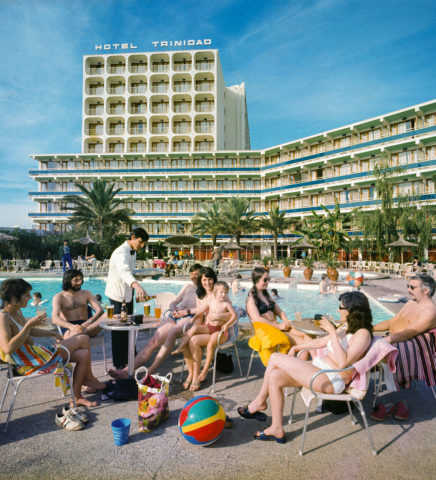RATIO; The Old in the Now
By Renee Umsted
Old books are, perhaps, some of the greatest remainders of the past. They are little fragments of history embedded in today’s fast-paced, digital society–markers of what was in a society always searching for what’s next. A part of both the world of humankind and the world of books, they are only a percentage of what exists, only a piece of the ratio.
Antiquarian bookstores certainly fill a gap in the market, offering goods for purchase as well as wondrous spaces beckoning to be explored. Like the items that line their shelves, bookstores across the world serve as glimpses into a former time, themselves representing stories and histories waiting to be told.
Though there are many, these sellers of rare works housed in old buildings comprise only a portion of London’s booksellers.
The classic book dealer Maggs Bros. Ltd., which was established in 1853, has occupied several locations throughout its existence, its current address in Bloomsbury. A family-owned business since its creation, Maggs Bros. has become and adviser and bookseller for both personal and institutional collections, including those of King George V. The company has handled two Gutenberg Bibles in its history, one of them acquired through negotiations with the Russian government.

Photo credit: Moondaisy (Wikimedia Commons)
In 1969 a man named Peter Harrington started selling rare books and first editions in the Chelsea Antiques Market on King’s Road. The company, Peter Harrington London, moved to its Fulham Road location in 1997 and now includes The Chelsea Bindery, which produces leather binding and boxes, as well as restorations, for the bookshop and its customers. Pom, Peter’s son, took over the business in 2000 and still manages it today. The four-story shop holds more than 15,000 volumes and 6,000 works on paper.
Though not as old as Maggs or Peter Harrington, Daunt Books was established in a place built for antiquarian bookseller Francis Edwards in 1910. Founded in 1990, Daunt has expanded from its original Marylebone High Street address to include an additional five locations. Much of the books sold here are arranged by country, so fiction and nonfiction works are grouped together, creating an interesting browsing experience. In 2010, Daunt Books Publishing opened, reissuing modern editions of old classics and releasing new titles from the authors of today.

Obviously London is not the only global city that boasts a rich history of antiquarian booksellers; Paris and New York are both home to notable and prestigious firms of this kind.
At the start of the 19th century, Venetian resident Giovanni Antonio Galignani opened La Librairie Galignani–a bookshop, publishing house and reading room that specialised in the English language–on rue Vivienne. Years later, in 1856, the shop was moved to rue de Rivoli, where it remains today. Galignani also founded an English-language daily newspaper called Galignani’s Messenger, which included contributions from writers such as Wordsworth and Byron. By the beginning of the 1900s, the publishing house and newspaper ended, but the bookstore remained, as it does today.
A newer bookshop in Paris is Shakespeare and Company. Sylvia Beach opened the original in 1919 at 12 rue de l’Odéon, and it was a popular hangout spot for the iconic expat writers–Ernest Hemingway, F. Scott Fitzgerald and Gertrude Stein, to name a few. It no longer exists, but its legacy lives on in the current Shakespeare and Company, which was founded by American George Whitman in 1951. That store, located at 37 rue de la Bûcherie, was first called Le Mistral and was renamed in 1964, on the 400th anniversary of William Shakespeare’s birth, to honor Beach. Authors are invited to sleep at Shakespeare and Company in return for three things: they have to read a book a day, help in the shop for a few hours and write a one-page autobiography.
Across the Atlantic, a few bookstores in New York City help to reveal information about the past and contribute something to the present.
Argosy Book Store in Midtown is the oldest-surviving independent bookstore in the city, established in 1925. Its first location was in ‘Book Row’ on Fourth Avenue, but it moved to E. 59th Street in 1930 due to high rent prices. The bookstore is housed in a six-story building, and there are still enough items to fill a warehouse in Brooklyn. Specialising in Americana, modern first editions, autographs, art, photography, and antique maps and prints, Argosy is currently under the management of the third generation of the Louis Cohen family. Throughout its existence, the bookstore has served clients including former American President Franklin Delano Roosevelt, actress Grace Kelly and designer Donatella Versace.
Strand Books, which was founded in 1927, was also a part of ‘Book Row,’ and it wasn’t until 1957 that the store moved to its current location on 12th Street and Broadway. Ben Bass created the store with $300 of his own money and $300 of his friend’s and named it after the famous London street. The Strand carries more than 2.5 million new, used and rare books and has been managed by members of the Bass family since its opening.

Photo credit: J B (flickr)
Whether an antiquarian bookstore is located in London, Paris or New York doesn’t matter, but what does matter is that it represents a piece of the past. Both in the books they contain and the buildings in which they are housed, history is revealed. And while the bookstores are reminiscent of the past, they are, undeniably, a part of the present. They make up only a portion of the bookstores that exist today, but without them, the world of bookstores would be incomplete.





